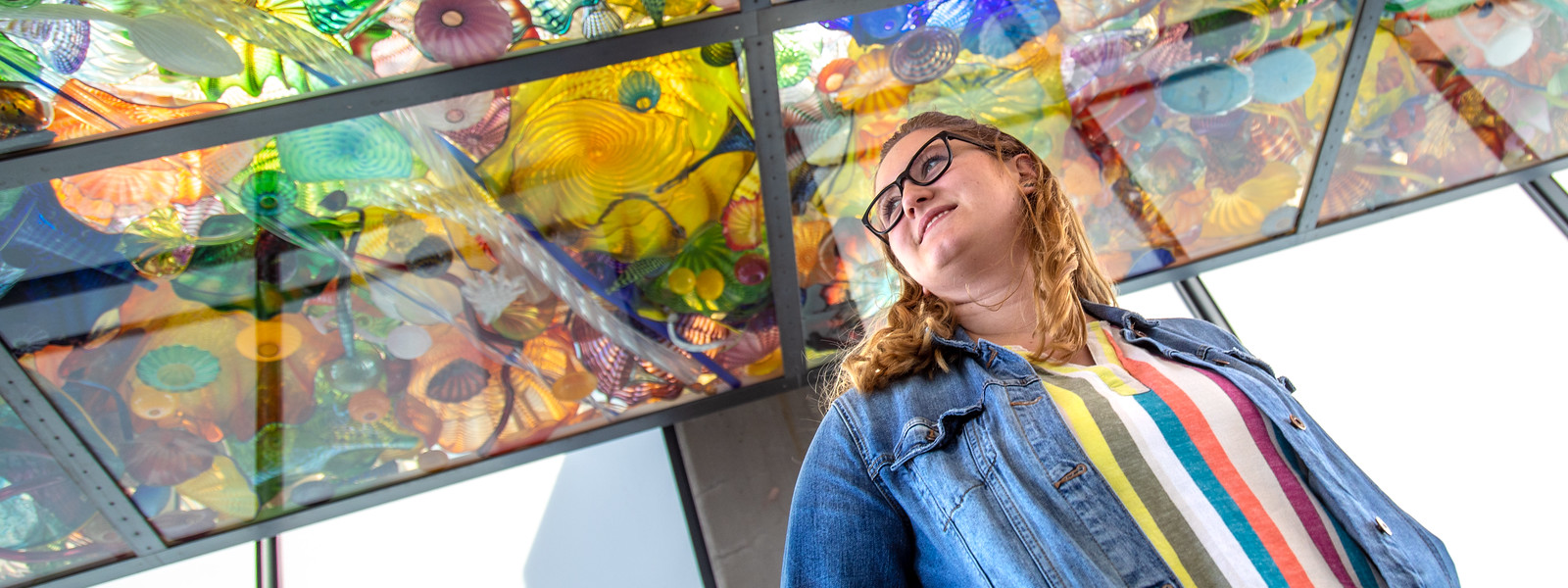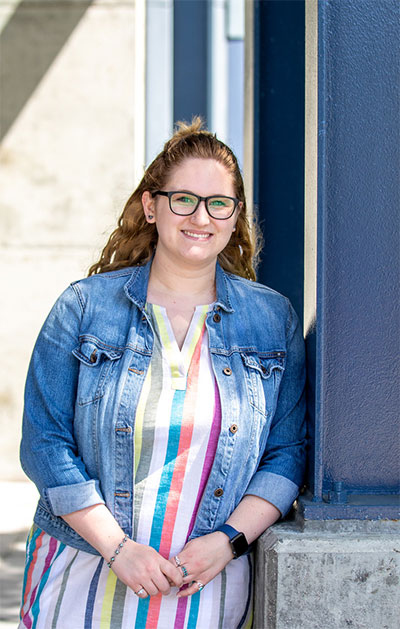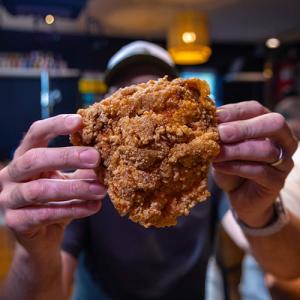
Ashley Richards: A Sustainable Future
For Ashley Richards, ensuring a sustainable future means emphasizing the needs and civic participation of youth, with a focus on equity.
(Photo above: Ashley Richards, '19 Sustainable Urban Development/Global Honors, on Tacoma's Chihuly Bridge of Glass.)

Ashley Richards, '19 Sustainable Urban Development/Global Honors, came from a small town but may one day be a big-city planner. Majoring in Sustainable Urban Development (SUD), Richards wants one day to work on creating sustainable housing in Tacoma. “What’s more important than making sure everyone has a place to live?” she said.
Richards grew up about 20 miles east of Tacoma in Buckley. She says there wasn’t much to do in the rural community. During her free time, she joined the Future Farmers of America (FFA), which ended up sparking her interest in the environment. “I was a part of the agricultural issues team,” said Richards. “We did research on current issues in agriculture, usually ones that had controversy attached to them.” Working closely with others in the organization, Richards developed a passion for people and an understanding of the experience of others. “I loved being able to work with other underclassmen to get involved at school and share my love of research and agriculture,” she said. “It was my lifeline in high school, and taught me a lot about working as a team for a common goal.”
Richards found her calling while taking an environmental science class in high school. “The course offered a perspective on the environment that went beyond just agriculture and farmland,” she said. “This was when I started to think about working in the planning field — though more related to environmental planning like in a parks department.” Richard’s interest developed into an understanding about how the environment relates to community. “I was fascinated by urban agriculture because it brought ‘traditional’ farming practices and adapted them to work in cities. There was such an obvious link to food systems and security,” she said.
Richards wanted to be a Husky her whole life, but when the time came to apply to college, she was intimidated by the large campus and class sizes of UW in Seattle. Her father, who was working in Tacoma at the time, suggested she apply to UW Tacoma. “After speaking to my friends who came here, I decided that UW Tacoma was the right place for me,” she said. “I liked that there was so much diversity in Tacoma. It’s fast-paced, and there’s a hustle and bustle on campus that integrates the urban life around it.”
For Richards, the shift from environmental science into SUD came through a disinterest in so-called “hard” sciences. “I realized that I didn’t want to take chemistry,” she said. “I was really interested in environmental science because of the social side of it. We are all influenced by the environment, and therefore it is the responsibility of all of us to take care of it.” From there, she spoke with advisors about her options and they suggested Sustainable Urban Development. “I was attracted to the program because it provides the opportunity to help people and have a say in planning and the environmental side of community development,” she said.
Richards is involved on campus, but it didn’t start that way. “I really got involved with the campus community after I got a job on campus as a Student Advising Mentor,” she said. In the position, she helped first-year students and pre-majors navigate higher education. “I get such joy from helping people, and being a mentor continued to foster that in my time at UW Tacoma,” she said. “Through advising, I felt more comfortable involving myself with campus activities and ended up joining the Chancellor's Advisory Committee for Sustainability and working with student sustainability organizations.”
“Helping others is the single most important motivator for me. I want to be able to have the opportunity to influence development in a way that our communities are being served justly with a focus on their needs.”
— Ashley Richards
Going into her senior year, Richards was relieved to only have classes to focus on. She had just finished her thesis with the Bamford Fellowship in Global Engagement about racial inequality in education while completing a certificate in Geographic Information Systems (GIS). “My junior year was so packed, I was constantly busy with research,” she said. “Both of these projects felt really crucial in my learning because they provided both a technical and social format to understand community and inequality.” What she didn’t realize was that they were also building blocks for her next step in grasping urban planning. “My relief quickly became boredom. I was looking for what avenue to go down next, and saw advertisements for researchers to participate in the Action Mapping Project (AMP) with Dr. Matt Kelley,” she said. Wanting to continue developing her research abilities, she applied and hit the ground running as a research fellow.
AMP is an initiative started at UW Tacoma to understand the experiences of youth in neighborhoods in an effort to improve the safety and well-being of those neighborhoods. A part of Richard’s piece in the project was recording the progress of student participants in high schools and rewriting the GIS curriculum taught to high school students. “I shortened instruction so that it was easier to follow in a classroom setting and incorporated new data to make learning more interesting and relevant to their experience,” she said. “I’m so glad I applied to AMP because it’s taught me a ton about participatory planning as well as the important role of youth in urban settings.”
Earlier this year, the scope and impact of Richards' time at UW Tacoma was recognized at the university level when she was name to the 2019 Husky 100. The university-wide honor recognizes graduate and undergraduate students who are making the most of their time at UW.
Following graduation, Richards plans to pursue graduate study in sustainable urban development at the University of Oxford. In the part-time program, students only meet a few times a year, allowing her to “commute to the United Kingdom when necessary.” In the meantime, she is looking for a GIS or urban planning position to apply what she’s learned at UW Tacoma to the real world. “I would love to be a part of an agency that works with youth through information practices and policy, similar to what Dr. Kelley is doing with AMP,” she said. Her interest in this profession is simple; “It makes me unhappy to see people struggling for their basic needs, because it is unnecessary,” she said. “There is more than enough for all of us, it’s just a matter of figuring out how to split resources equitably.”
Recent news
Main Content
Educated Palate
Main Content
Lawless Honored with Governor’s Student Civic Leadership Award
Main Content
Towards the Functional Characterization of All Human Genes
UW Tacoma in the News
Main Content
Minnesota adoptees respond to fraud reports in South Korean adoption programs
Main Content
What’s next for The Swiss? Upcoming workshop to tackle how to best use iconic site
Main Content
Local Leaders Recognized at UW Tacoma’s Business Leadership Awards
Contact Information
- Phone: 253-692-5880
- Email: uwturban@uw.edu
- Urban Studies, School of (directory)



